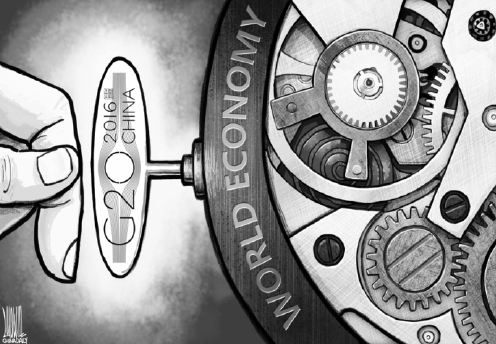G20 Hangzhou Summit to help find new path for world economic growth
Updated: 2016-05-26 07:34
By Li Baodong(China Daily)
|
|||||||||
 |
|
LUO JIE/CHINA DAILY |
The 2016 G20 Summit will be held in Hangzhou in September under the theme of "Toward an Innovative, Invigorated, Interconnected, and Inclusive World Economy". An integral part of the theme is inclusive and interconnected development.
China holds the Presidency of the G20 this year and under its initiative, for the first time, the G20 is highlighting development issues in the framework of global macro-policy and working on a systematic plan of action for the implementation of the United Nation's 2030 Agenda for Sustainable Development. China is doing this for a number of important reasons.
Promoting G20 cooperation is needed to implement the 2030 Agenda for Sustainable Development, which commenced this year. Adopted at the UN Sustainable Development Summit last September, the Agenda is a future-oriented blueprint and a powerful written commitment. But setting the goals is only the first step. It must be followed through with the hard work and cooperation of all countries. The G20 is a major platform for international economic cooperation, and the international community expects it to play a leading role in this respect.
Development cooperation
Promoting G20 development cooperation is crucial for tapping new potential for world economic growth. As global economic growth, trade and investment remain sluggish, and the macro-policies of major economies diverge, new inequalities and imbalances in development may emerge. There is tremendous potential for the development of developing countries, which is like a blue sea yet to be navigated. Tapping this potential could unleash immeasurable power for growth and promote a global economic recovery.
Promoting development cooperation is China's unique contribution to the G20. China, the world's largest developing country, has been on a unique journey of development and maintains close connections with other developing countries. As it holds the G20 Presidency in 2016, China is playing the leading role in pushing the G20 to fully implement the 2030 Agenda for Sustainable Development, find a new path for world economic growth, and make its due contribution to the international cause of development.
Inclusive and interconnected development deals directly with development issues, facilitates coordinated progress among various economies, promotes interconnected and win-win development of all industries and enables people in all social strata to share in prosperity. It will be a major highlight of the summit.
This year, the G20 will formulate an action plan for implementing the 2030 Agenda for Sustainable Development. As a concrete step to contribute to the work led by the UN in this regard, collective and national actions will be taken to push for implementation among the G20 members and to support other developing countries in their implementation efforts.
This year, the G20 will advance cooperation initiatives on supporting industrialization in African countries and the Least Developed Countries to help speed up industrialization in these countries and attain the poverty reduction and sustainable development goals.
The G20 will also place high importance on climate change this year. It has already released its first ever Presidency Statement on Climate Change, committing members to sign the Paris Agreement, which opened for signature on April 22 and remains open for signature one year thereafter, and bringing it into force as soon as possible. The UN Secretary-General Ban Ki-moon responded with a special statement, in which he welcomed the responsible position of the G20 and extended his thanks to China for its leadership.
In addition, the G20 will discuss agriculture, employment, inclusive business and other wide-ranging issues; shed light on issues related to women, youth, and small farmers; promote agricultural innovation and sustainable development; explore the relationship between macro-policy regulation and job creation; and encourage employment through entrepreneurship and innovation.
It should be made clear that the G20 stresses a broader concept of development. While making feasible action plans to tackle development issues based on member's own comparative advantages and added value, it also calls for an economic perspective and explores the relationship between growth and development in multiple dimensions. The Hangzhou Summit will not only focus on development itself, but also embrace development as a source of economic growth, and this is a main thread running through the G20 agenda.
A development perspective is taken in all the key agenda items of the G20 this year, including macro-economic policy, international trade and investment, innovation in growth models and global economic governance.
Under the agenda item of "breaking a new path for growth", the G20 will focus discussions on innovation, the new industrial revolution, the digital economy and structural reform. This aims to break the current model of sole reliance on fiscal stimulus and easy monetary policy through innovation-driven growth strategies and structural reform, and boost the potential for mid- to long-term growth.
China is working with fellow members to draw a blueprint for innovation-driven growth that highlights the concept of inclusive innovation, does more to help developing countries raise their R&D capacity, narrows the gap and bridges the digital divide between developed and developing countries in terms of industrialization, and lowers the threshold for developing countries to integrate into the new economy and helps them share the benefits.
Related Stories
China to play 'very important role' at G20 Summit: Jim O'Neill 2016-05-22 08:01
G20 Summit to help China play better role 2016-04-08 08:06
Stocks dive to month low ahead of G20 Summit in Shanghai 2016-02-25 15:56
China adds wisdom and strength to next G20 summit 2015-12-17 22:16
Today's Top News
Refugees relocated during major police operation
China calls for concerted anti-terror efforts
London's financial centre warns of dangers of Brexit
Russia blasts NATO for Cold War mentality
Vietnam, US adopt statement on partnership
Alibaba expands in Belgium amid protectionism
Eiffel Tower to become rental apartment for first time
Wreckage of crashed EgyptAir plane found at sea
Hot Topics
Lunar probe , China growth forecasts, Emission rules get tougher, China seen through 'colored lens', International board,
Editor's Picks

|

|

|

|

|

|







